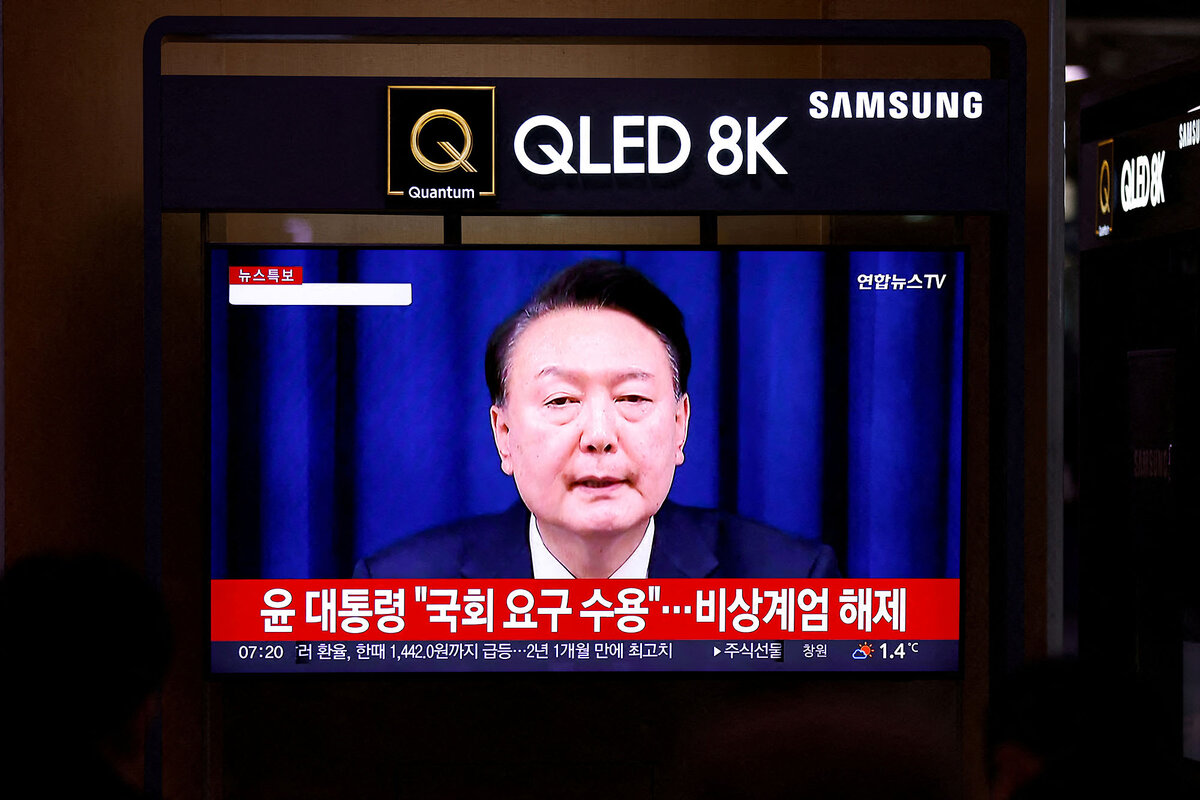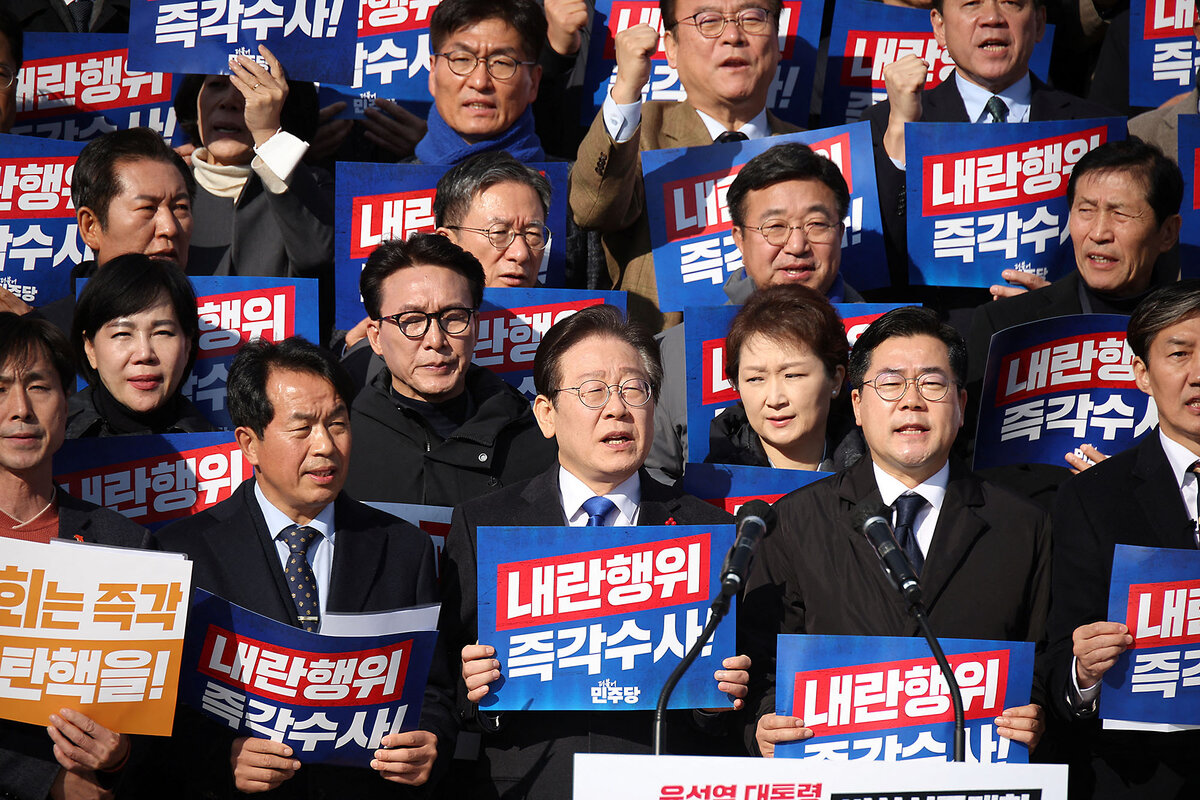Martial law for a moment: What just happened in South Korea
Loading...
Facing political stonewalling and declining popularity, South Korean President Yoon Suk Yeol attempted to impose martial law Tuesday night. Without offering evidence, he accused North Korea sympathizers of “paralyzing” his administration and “inciting internal rebellion.”
Lawmakers raced to the parliament building, where they voted to nullify Mr. Yoon’s martial law order, even as South Korean troops stormed the building. Political leaders and protesters immediately called for him to step down.
Why We Wrote This
South Korean President Yoon Suk Yeol’s surprise declaration of emergency martial law lasted only six hours. But it has plunged South Korea – a key Asian economy and U.S. ally – into a political crisis that could last much longer.
The rapid and powerful pushback, including by lawmakers from Mr. Yoon’s party, reflected a deep-seated bitterness over South Korea’s history of military dictatorship. Martial law has now been lifted, but protesters in Seoul’s streets are chanting for Mr. Yoon’s removal, and six opposition parties have submitted a motion to impeach. A two-thirds majority vote is required for the parliament to call for a president’s impeachment – a number experts say is within reach.
“There’s going to be a fight for sure,” says retired South Korean army Lt. Gen. Chun In-bum, an expert in national security.
“But we have been through this before,” he adds, recalling the 2016 removal of then-President Park Geun-hye over a political scandal. “I am optimistic that we will be able to find our way.”
Facing political stonewalling and declining popularity, South Korean President Yoon Suk Yeol attempted to impose martial law this week – and failed spectacularly.
In a late evening television address Tuesday, Mr. Yoon argued that North Korea sympathizers were “paralyzing” his administration, and announced military rule. Lawmakers raced to the parliament building, where they voted to nullify Mr. Yoon’s martial law order, even as South Korean troops stormed the building. Political leaders and protesters immediately called for him to step down. Hours later, Mr. Yoon lifted martial law.
The rapid and powerful pushback, including by lawmakers from Mr. Yoon’s party, reflected not only the widespread view that he had overreached, but also deep-seated bitterness over South Korea’s dark legacy of coups and military dictatorship as recently as the 1980s.
Why We Wrote This
South Korean President Yoon Suk Yeol’s surprise declaration of emergency martial law lasted only six hours. But it has plunged South Korea – a key Asian economy and U.S. ally – into a political crisis that could last much longer.
“There’s a strong sentiment against strongman rule in Korea,” says retired South Korean army Lt. Gen. Chun In-bum, a decorated military commander, former defense official, and expert in national security. “Mr. Yoon miscalculated.”
Q: Who is Yoon Suk Yeol, and why did he declare martial law?
A veteran prosecutor and political outsider, Mr. Yoon won South Korea’s 2022 presidential election by a razor-thin voter margin of less than 1% – the smallest difference between two leading candidates in the history of South Korea’s presidential elections. Mr. Yoon, the candidate for the conservative People Power Party, had never held a seat in parliament or a Cabinet position. He campaigned on supporting small business and soldiers, as well as promoting democracy and closer ties with Japan and the United States.
“I will reestablish liberal democracy, the rule of law and the value of fairness,” Mr. Yoon said in announcing his candidacy in June 2021.
But amid personal scandals, labor strikes, and other controversies, Mr. Yoon’s job approval rating steadily declined from over 50% when he took office to around 20% last month. Prior to the martial law debacle, hundreds of thousands of South Koreans signed a petition calling for his removal.
Meanwhile, the opposition Democratic Party, which holds a majority in parliament, has stymied Mr. Yoon’s administration, including through motions to impeach top officials and prosecutors and by blocking Mr. Yoon’s proposed budget.
Without offering evidence, Mr. Yoon accused “anti-state forces” sympathetic to North Korea of undermining South Korea’s democracy by “inciting internal rebellion.”
“The National Assembly, which should be the foundation of liberal democracy, has become a monster trying to destroy it,” he said Tuesday. The martial law decree banned all political activities and labor strikes, as well as “fake news,” and put all media under the control of the Martial Law Command, headed by army Gen. Park An-su.
Q: What was the political fallout?
Following Mr. Yoon’s announcement, opposition leaders and protesters immediately called for him to step down.
On Wednesday, six opposition parties announced they had submitted a motion to impeach Mr. Yoon. A two-thirds majority vote is required for the parliament to call for a president’s impeachment – a number experts say is within reach. The matter would then move to South Korea’s Constitutional Court for a decision. If Mr. Yoon were to step down or be removed, Prime Minister Han Duck-soo would assume the duties of president.
Protesters chanting for Mr. Yoon’s removal rallied in Seoul Wednesday night.
“There’s going to be a fight for sure – not with fists and clubs, but in the courts and halls of the National Assembly. The Korean people will be the biggest loser,” says General Chun.
“But we have been through this before,” he said, recalling the 2016 impeachment and removal of then-President Park Geun-hye for involvement in a political scandal. “I am optimistic that we will be able to find our way.”
Q: How will South Korea’s political uncertainty impact its security?
As a treaty partner of the United States, South Korea has a solid partnership with the U.S. military as well as European forces under the United Nations Command, which helps safeguard the country from North Korean aggression.
Pyongyang may exploit the political unrest in Seoul as a propaganda tool, experts say. More concerning for Washington and Tokyo, however, is that the potential replacement of Mr. Yoon would deprive the tripartite alliance of a powerful advocate. Mr. Yoon oversaw a dramatic easing of tensions between South Korea and Japan, and the advancement of defense cooperation with both Washington and Tokyo.
“This will ... strain South Korea-Japan ties and make trilateral cooperation with the U.S. more difficult, potentially leading to more instability in the region, emboldening Russia, China, and North Korea,” said Alexander Lipke, Asia program coordinator at the European Council on Foreign Relations, in an email.
The U.S. Embassy released a statement calling Mr. Yoon’s ending of martial law “a crucial step,” and stressing the need to “support our shared values.” It reiterated the U.S. “ironclad commitment” to the alliance.
More broadly, experts say that Seoul’s preoccupation with its domestic political crisis is likely to distract from its ability to focus on global issues, such as Ukraine.










